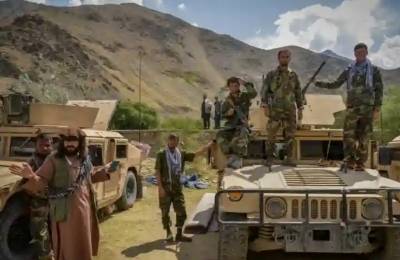For the last 24 hours guns are silent in the famed Panjshir valley as negotiations between the Northern Alliance, the flagbearer of armed resistance, and the Taliban, the new rulers of Afghanistan, begin.
According to news emerging from Panjshir, both the groups had their first direct talks on Wednesday and Thursday, which, so far, have remained inconclusive. The dialogue was held in Charikar, the capital of Parwan province, neighboring Panjshir.
Advertisement
“After three hours of discussion, it was decided that both delegations will share the message with their leadership and resume the negotiations to reach a durable peace in the country. It was also decided that the parties should not attack each other until the second round of negotiations,” Mohammad Alam Ezedyar, a representative of the resistance front told the Tolo news.
Ahmad Massoud, the leader of the resistance movement did not participate in the first round of the talks.
“There were some of the former ministers, some of the former MPs (members of parliament), not only from Panjshir but from other provinces, too,” Fahim Dashty, who is working closely in Panjshir with Ahmad Massoud, was quoted as saying by the news channel.
Despite the de facto ceasefire, the dialogue, as expected did reach any firm conclusion. Yet the outlines of the agenda for talks did emerge. The Taliban wanted to discuss the future of Panjshir, while Massoud’s representatives wanted to discuss the structure of the future government. The Panjshir resistance has made it clear that the future government of the country will have to be an inclusive one where there will be equal rights for women and minorities.
And in the meeting, Massoud’s representatives were more focused on the overall structure of the governance system. Since there was a big gap between the two sides’ demands – a power-sharing deal as proposed by the resistance and the status of Panjshir by the Taliban– both sides decided to take the messages to their leaders and it is expected they will meet soon.
“We are still waiting for the outcome of the negotiations. Despite this, we have all the military preparations as well,” Massoud told the media that he will never surrender the Panjshir valley to the extremist group, but is ready for a dialogue.
The Taliban has claimed that their fighters have surrounded the Panjshir Valley and they want peaceful negotiations.
“The enemy is under siege. We are fighting for a peaceful settlement and trying to solve the problem through negotiations,” says the Taliban’s spokesperson, Zabihullah Mujahid.
Massoud, the son of legendary Afghan rebel commander Ahmad Shah Massoud, is presently residing in the Panjshir valley along with former vice-president and “acting” president Amrullah Saleh.
Meanwhile, Mohammad Mohaqiq, Hazara leader and chairman of the People’s Islamic Unity Party of Afghanistan has announced support for Massoud’s fight for an inclusive government. Mohaqiq is also known to be close to the Iranians, who share close ethnic and linguistic bonds with the Hazara, mainly residing in the Bamiyan plains, north of the famous Salang pass in the Hindukush mountain ranges.
“We support Ahmad Massoub — if the Taliban do not comply with an inclusive government and attack Panjshir Valley,” Mohaqiq observed.











